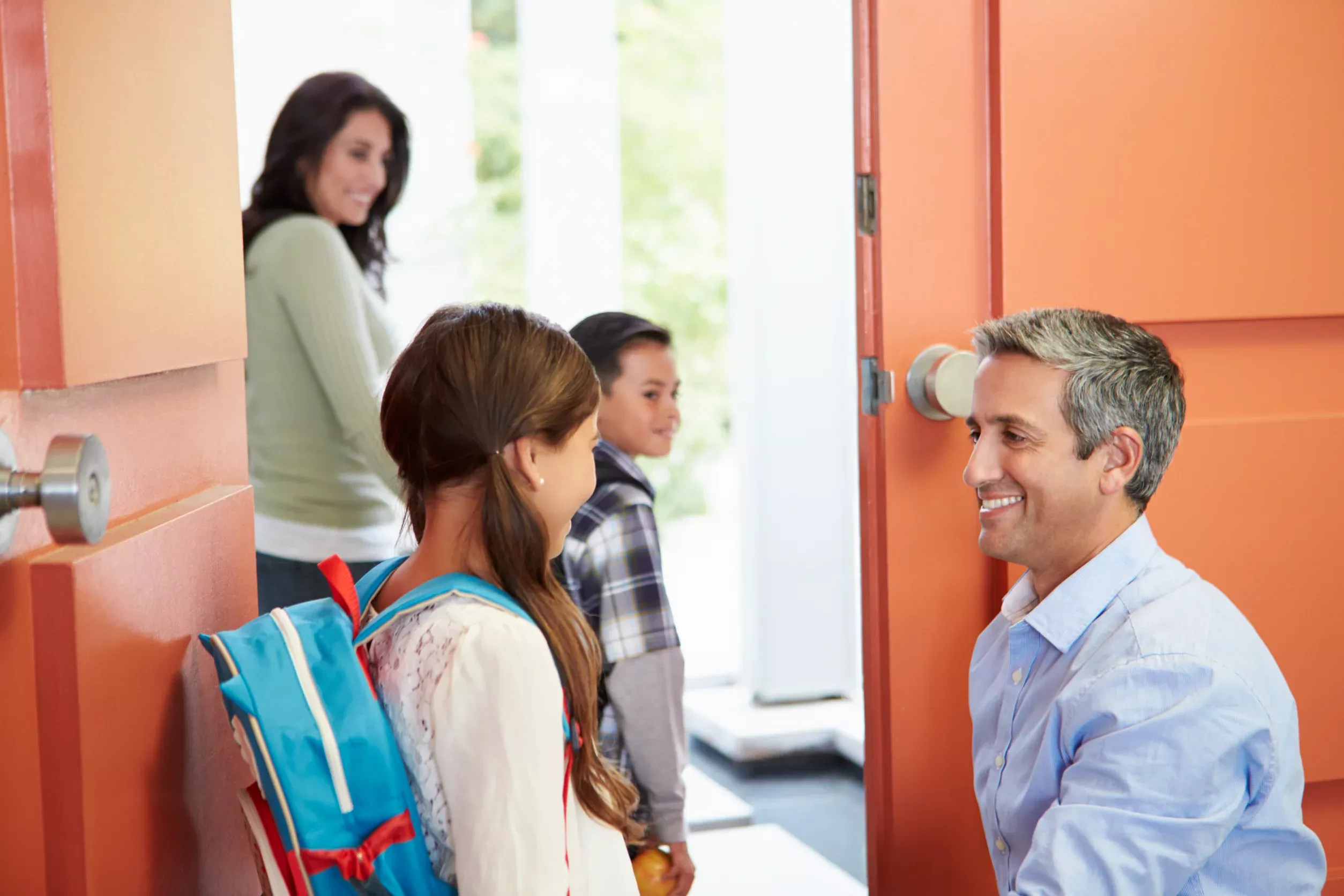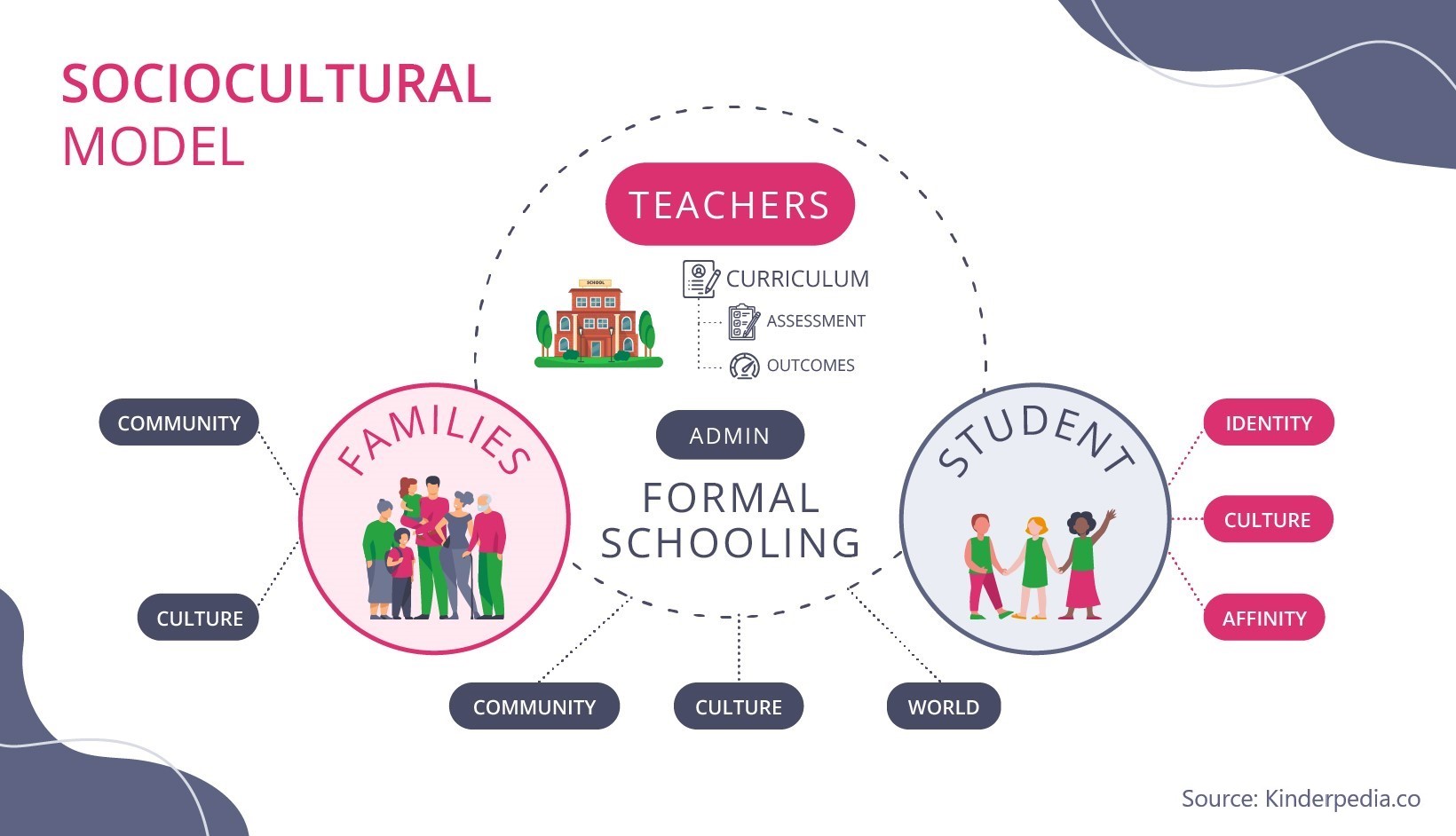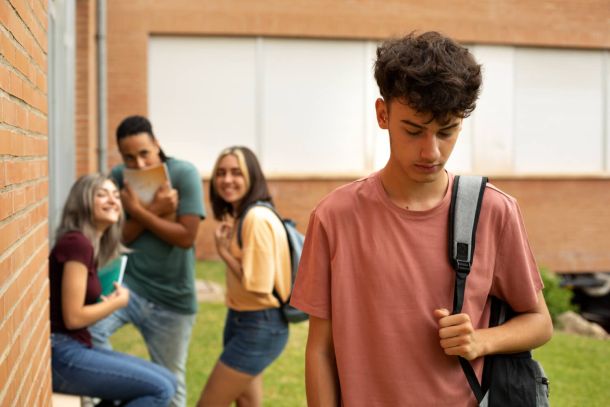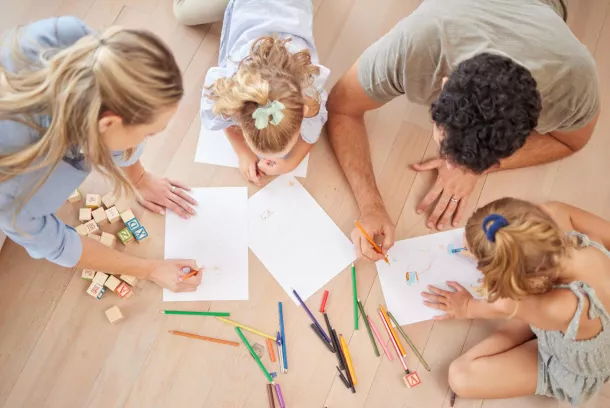Family engagement in education has a major impact on the harmonious development of children. By direct family engagement in children's education, we mean a collaborative relationship between parents, educators and other partners to support and enhance each student's learning, development and health.
Parental engagement in children's education: the role of the family in relationship with school or kindergarten
Family engagement in education describes what parents or extended family do at home and in the community to support their children's learning and harmonious development. The American Psychological Association describes the relationship through two main coordinates: partnership, on the one hand, and shared responsibility for children's growth and well-being, on the other.
Such a partnership is essential for improving well-being in schools, but also for increasing children's motivation to be actively involved in
activities and their own learning.
In the family, the child learns language and social behaviour, forms aspirations and ideals, beliefs and skills, traits of will and character. The environment, the family climate, always influences the child's personality in relation to its nature.
The greatest educationalist John Locke, convinced of the power of example in the family, said: "You should do nothing to a child which you do not wish him to imitate".
In numerous works, such as
The Family Engagement Inventory: A Brief Cross-Disciplinary Synthesis, family engagement in schools is defined as collaboration between parents and school staff at the classroom, local and system levels to support and enhance the learning, development and health of children and adolescents. Family involvement in schools is a shared responsibility in which schools, other agencies, and community organizations commit to involving parents in meaningful ways, and parents respond with active support in the learning and developmental processes their children and teens go through
Models of family engagement: supporters, contributors or collaborators
Graff C.S. and Sherman, B. (2020), in their paper "Models of school-family relations" published in the Oxford Research Encyclopedia of Education, look at family engagement in partnership with the school through the lens of three major pedagogical theories.
Three specific learning theories - behaviourist, sociocultural and critical - demonstrate clear differences in the way parents' and families' roles in their children's education are understood. Each of these theoretical lenses produces different answers to the question "What does it mean to work with families?". They imply different conceptualisations of parental involvement, the challenges to this involvement and inclusion, and the tools used to address these challenges.
Families can be positioned as passive receivers of the process, contributors to the process itself or as producers of knowledge. In terms of their child's schooling, parents can be seen as supporters, contributors or collaborators. They can be situated at the periphery of schooling or at the centre.
Traditional model of involvement: family supports outside education
Theorists see behaviourism as the basis of what we now call the traditional paradigm of family involvement. Behaviorism is relevant not in how its principles operate in classrooms, but rather in how they position teachers, students, and schooling in relation to the family. Often, this positioning is centered on school leaders and downplays family and students.
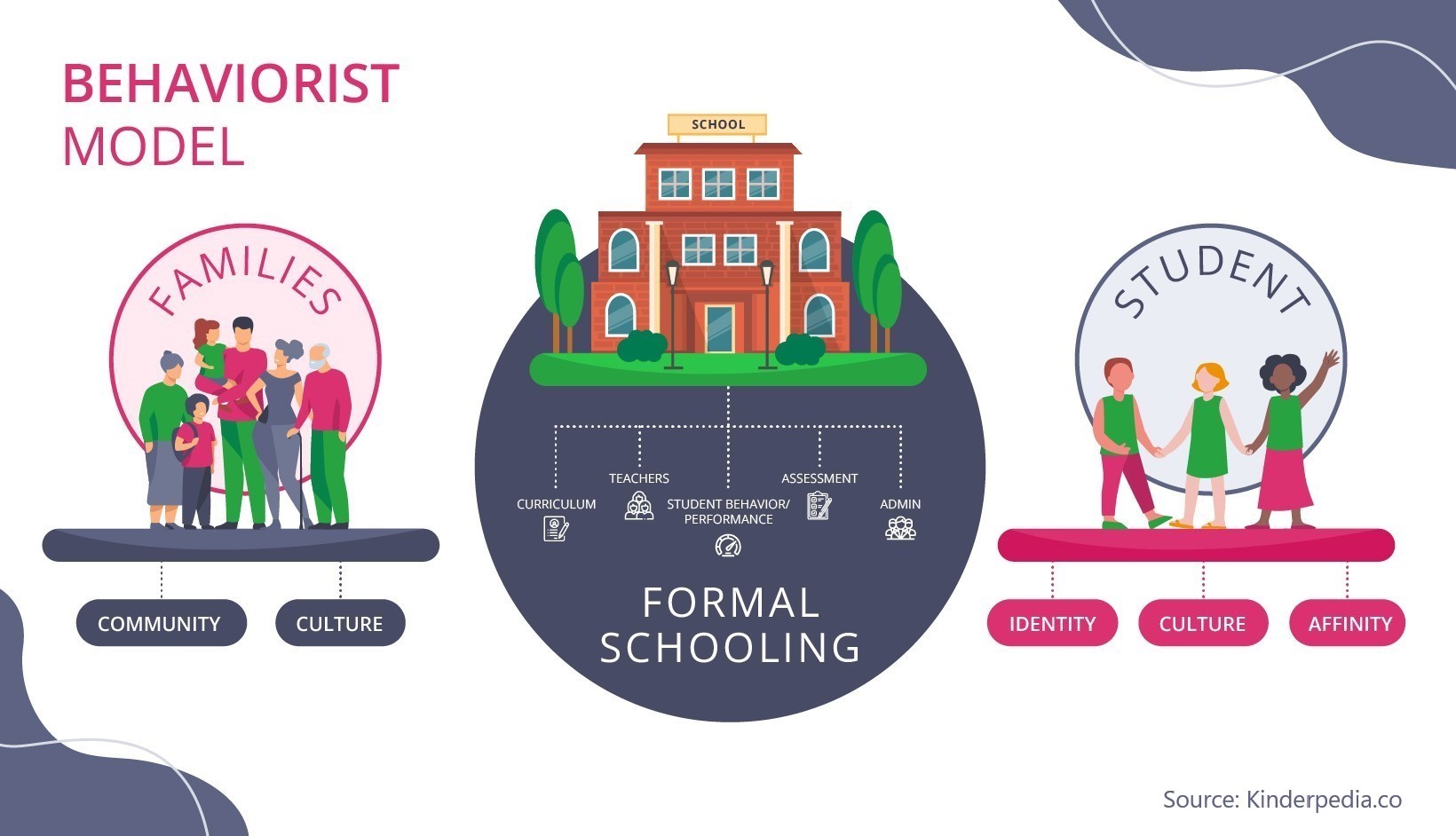
In this figure, the circle of formal schooling includes the actors that influence and shape it, as well as the elements that are relevant in shaping it. Schooling is shaped by administrators and teachers, with curricula and assessments that include both large-scale standardized exams and grade-level assessments built around student performance and behavior. Students as human beings are abstracted into objective measurements. It is not students as persons, but their observable behavior in the form of test scores, compliance, demonstrated abilities, etc.
Within behaviorism, teachers work with students as craftsmen work with clay: They model student behavior according to their design. Schools work with families in the same way. In traditional family-school relationships, families' behaviours are assessed in isolation.
Socio-cultural model: the family contributes to education by creating a positive learning context
While behaviourism focuses on learning as isolated, observable behaviour, sociocultural theory focuses on individual and collective experience, on the construction of meaning. Sociocultural theory assumes that learning takes place in our social environments and develops largely through interactions with peers and adults throughout a person's life (Vygotsky, 1978).
Learning cannot be separated from the human mind, body and culture (Cole & Engestrom, 1993).
Through a sociocultural lens, the partnership with the family is rethought as deliberate. According to Rogoff (1990), families are more actively included in schools in that students' experiences and knowledge are shaped by the social, cultural, and historical conditions of their own families, and learning is seen as culturally situated, competent participation in the whole community (Smith, Teemant, & Pinnegar, 2004).
The transformative model: the partnership between school and family is action-oriented
In the case of this model, through a transformative lens, working with the family is conceptualised as working with parents and thus paving the way for family-oriented practices. Parents of students in the school are involved in decision-making alongside school leaders to have a beneficial impact on student learning and success (Santamaría Graff & Boehner, 2019).
Although characterizing family-school relationships as partnerships is by no means new, for many parents this term is empty rhetoric, overused and not put into practice (Baquedano-López, Alexander, & Hernandez, 2013; Warren et al, 2009). A transformative approach to partnership, requires an awareness of the power dynamics between groups of people, the strengths they bring to a relationship, project, or overall atmosphere. In this case, partnership with families is action-oriented.
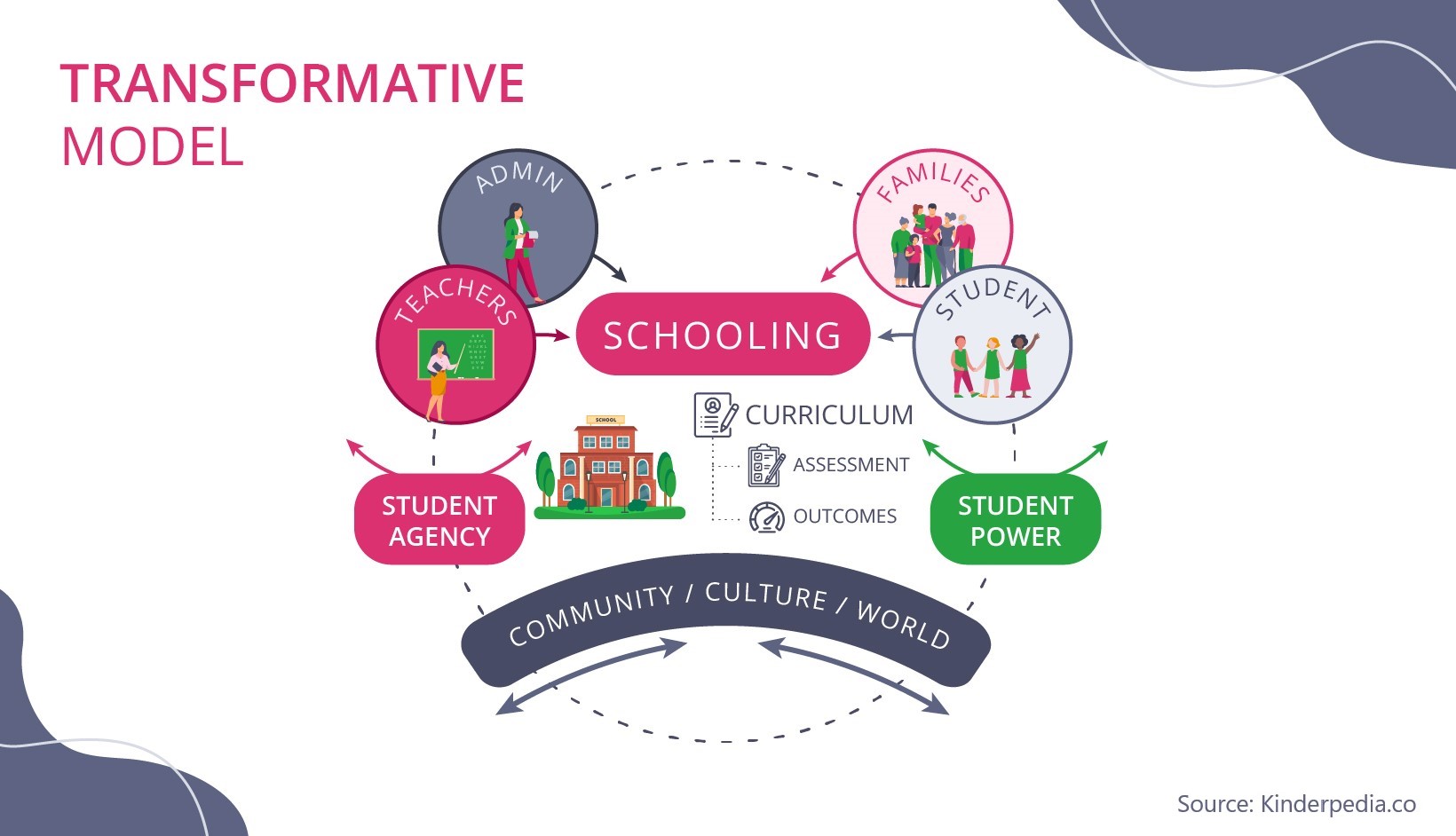
The perspective of family involvement in the child's educational process
Family involvement refers to the systematic inclusion of parents in activities and programmes that promote children's development, learning and well-being, including planning, teaching and assessment. To ensure that family involvement is integrated into all early childhood education systems and programmes, non-formal education providers and schools can involve families as essential partners, while providing services that encourage children's learning and nurture positive relationships between families and schools. Explaining to parents the process that children go through when learning new concepts and developing skills, as well as representing the assessment process, creates a transparent and secure foundation.
Family involvement is the process used to build authentic relationships with families. Healthy relationships support overall family well-being and the harmonious development of children. When families are engaged, partnerships are created that share a common goal - helping children grow and develop.
It happens at home, in the school setting and in the community. It's a shared responsibility of everyone who wants their little ones to succeed in school and in life. Family involvement is based on the idea that parents and other caregivers work together to prepare children for success.
Specific partnership goals for each family may vary and depend on family preferences, culture, and economic or social stress. A true partnership honors a family's strengths and culture, mutual respect, and shared goals as they relate to the child.
What do researchers say about the role of the family in the education of children?
Studies have shown that parental engagement in schools can promote positive education and health behaviours in children. There is evidence of a strong relationship between parental involvement and educational outcomes, including school attendance, grades and higher scores on national assessments. Parental involvement in schools has also been identified as a promising protective factor for adolescent sexual health risk behaviours and outcomes. In addition, when students feel that the school environment provides them with support and care, and their parents are involved in school life, they are less likely to engage in activities that could put their health and well-being at risk.
Key research summaries tell us that: children whose parents are active and interested in the educational process they are going through make visible progress from their first years at school. At the same time, children whose parents are involved in partnership with the school tend to achieve the best results in learning and also have fewer behavioural problems.
Levels of parental engagement are related to socio-economic status and the time they have available for particular activities. However, research shows that when families have a low socio-economic status, children can perform remarkably well if their family is actively involved with school managers and teachers.
From the perspective of the
American Psychological Association, the school-family partnership is designed to support and enhance the learning, development and health of children and adolescents. Parent involvement in schools is a shared responsibility in which schools are committed to reaching out to parents to engage them in meaningful ways, and parents are committed to actively supporting the learning and development of children and adolescents.
How Kinderpedia supports family engagement in children's education
Technology is here to support learning. On one hand by facilitating access to quality education, relevant content and timely interactions between students and teachers, and, on the other, by simplifying communication and collaboration between schools, nurseries and families.
On
Kinderpedia, parents find out in real time how their children’s day at school or nursery went: from attendance, grades, assignments, to mood, participation, or how much they ate and slept, in the case of younger students. When they are aware of their children’s projects and progress at school, parents can continue the educational process at home and support their children where they need it. Kinderpedia creates the environment for an effective partnership between school and family and places the student-teacher-parent collaboration right at the heart of learning.
